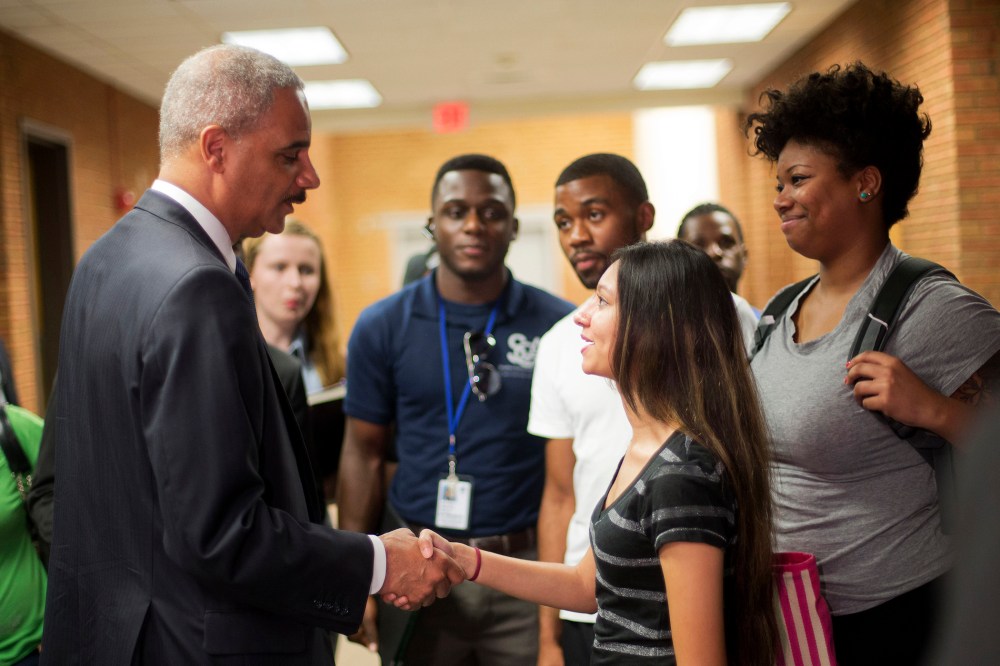FERGUSON, Missouri — For the second time in as many summers, the nation’s first black Attorney General has promised to use federal resources to investigate the killing of an unarmed black teenager.
On Wednesday, Attorney General Eric Holder arrived in this stubbornly segregated city as it exhales from days of violent protests and heavy-handed police rule following the police killing of unarmed teenager Michael Brown.
“I am the attorney general of the United States,” Holder told a group of local college students. “But I am also a black man.”
As he did last summer in the wake of the acquittal of Trayvon Martin’s killer, Holder spoke of his own experiences with racial profiling, the police, and being black in America.
“I understand the mistrust,” he told them.
Holder later met with residents and community, faith and business leaders to underscore just how vigorously the Department of Justice is investigating Brown’s killing and working behind the scenes to cool tensions.
As rioting and protests have torn Ferguson apart since Brown’s killing, calls are rising for the Department of Justice to take over his case from local law enforcement. Far short of that, Holder has promised a clear and thorough investigation.
Holder’s visit is unprecedented but not unexpected. When President Barack Obama, America’s first black president, tapped him to be attorney general, Holder promised to use his office to aggressively enforce federal civil rights laws. When the Trayvon Martin case sparked national protests and anger, Holder sent his community relations service to Sanford, Florida to mediate and assured the DOJ would fully investigate to determine whether Martin’s civil rights had been violated.
Holder told reporters on Wednesday afternoon that he has been kept up-to-date on all of the details of the Brown case and that he has assigned some of the department’s most experienced investigators to it. The department’s case is separate from that being conducted by St. Louis County, in that the DOJ is looking specifically for possible violations of federal criminal civil rights statutes.
Timeline of a tragedy: The Michael Brown story so far
Holder has sent dozens of federal investigators to Ferguson to conduct interviews with witnesses and other residents, saying “I’m confident that through the ability of these people that we’ll be able to make a determination of whether or not any federal statutes have in fact been violated.”
But more than a nod to the manpower assigned to the case, Holder’s visit offers some semblance of hope for Brown’s family and their supporters who don’t feel the case will be sufficiently investigated in St. Louis County.
Ferguson is a mostly black, poor and working class city with a long and troubling history of segregation and prejudice that residents say continues to manifest economically and politically. There are only three black police officers on the department’s 53-officer force. There are no blacks on the school board and the majority-black population has turned out abysmally low during elections.
Ferguson, residents say, used to be called “Sundown Town,” meaning, blacks had to be out by sundown. But mostly the prejudice manifests in interactions between blacks and the police, who they say routinely harass and target black residents. Though African-Americans are about 70% of the population, last yer they accounted for 94% of arrests, 92% of searches, and 86% of vehicular stops. The racial divide is deep, perhaps deeper through the lens of Brown’s killing.
In an interview with msnbc, Ferguson Mayor James Knowles insisted that there were no problems between blacks and whites and that everything was just fine. But residents tell another story. Holder heard a glimpse of their concerns on Wednesday.
“He really listened a lot to the residents. I think he has a good sense of what’s going on,” said Adolphus Pruitt, president of the St. Louis chapter of the NAACP, who attended the meeting. “He spent most of his time hearing from residents, how they feel about everything and getting a good idea about what their concerns were and that he understood and that he wanted to focus a lot on having people in the room that can help them on what they need to do in the long term after the cameras go.”
Pruitt said that Holder “reassured everybody that the Justice Department is doing what they are supposed to be doing in this investigation.” Pruitt added that Holder assured the group that the federal investigators leading the probe into Brown’s killing and a parallel look into past civil rights concerns regarding the Ferguson police department, is being handled by “the most experienced people who deal with these kinds of issues.”












